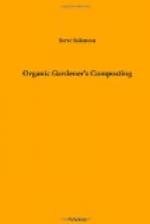In the late 1980s my interest turned to what academics might call ‘the intellectual history of radical agriculture.’ I reread the founders of the organic gardening and farming movement, only to discover that they, like Mark Twain’s father, had become far more intelligent since l last read them fifteen years back. l began to understand that one reason so many organic gardeners misunderstood Albert Howard was that he wrote in English, not American. l also noticed that there were other related traditions of agricultural reform and followed these back to their sources. This research took over eighteen months of heavy study. l really gave the interlibrary loan librarian a workout.
Herewith are a few of the best titles l absorbed during that research. l never miss an opportunity to help my readers discover that older books were written in an era before all intellectuals were afflicted with lifelong insecurity caused by cringing from an imaginary critical and nattery college professor standing over their shoulder. Older books are often far better than new ones, especially if you’ll forgive them an occasional error in point of fact. We are not always discovering newer, better, and improved. Often we are forgetting and obscuring and confusing what was once known, clear and simple. Many of these extraordinary old books are not in print and not available at your local library. However, a simple inquiry at the Interlibrary Loan desk of most libraries will show you how easy it is to obtain these and most any other book you become interested in.
Albrecht, William A. The Albrecht Papers, Vols 1 &2. Kansas City: Acres, USA 1975.
Albert Howard, Weston Price, Sir Robert McCarrison, and William Albrecht share equal responsibility for creating this era’s movement toward biologically sound agriculture. Howard is still well known to organic gardeners, thanks to promotion by the Rodale organization while Price, McCarrison, and Albrecht have faded into obscurity. Albrecht was chairman of the Soil Department at the University of Missouri during the 1930s. His unwavering investigation of soil fertility as the primary cause of health and disease was considered politically incorrect by the academic establishment and vested interests that funded agricultural research at that time. Driven from academia, he wrote prolifically for nonscientific magazines and lectured to farmers and medical practitioners during the 1940s and 1950s. Albrecht was willing to consider chemical fertilizers as potentially useful though he did not think chemicals were as sensible as more natural methods. This view was unacceptable to J.l. Rodale, who ignored Albrecht’s profound contributions.
Balfour, Lady Eve B. The Living Soil. London: Faber and Faber, 1943.
Lady Balfour was one of the key figures in creating the organic gardening and farming movement. She exhibited a most remarkable intelligence and understanding of the science of health and of the limitations of her own knowledge. Balfour is someone any serious gardener will want to meet through her books. Lady Balfour proved Woody Allen right about eating organic brown rice; she died only recently in her late 90s, compus mentis to the end.




